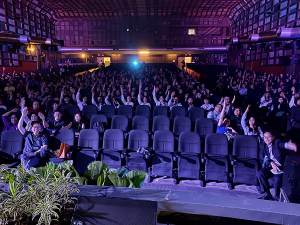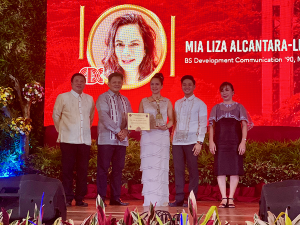 Dr. Mia Lustria is a professor and chair of the Education Committee at CCI’s iSchool. Earlier this month, she traveled to the University of the Philippines Diliman as a keynote speaker for the 2019 Communication Research International Conference (CRIC). This year the conference focused on “Crossroads and off-roads in online worlds.” Dr. Lustria presented Mass Interpersonal Persuasion in Action: Examining Social Media as a Persuasive Technology.
Dr. Mia Lustria is a professor and chair of the Education Committee at CCI’s iSchool. Earlier this month, she traveled to the University of the Philippines Diliman as a keynote speaker for the 2019 Communication Research International Conference (CRIC). This year the conference focused on “Crossroads and off-roads in online worlds.” Dr. Lustria presented Mass Interpersonal Persuasion in Action: Examining Social Media as a Persuasive Technology.

The abstract states, “Mass media has always played a significant role in influencing individuals’ beliefs and attitudes through its broad reach. As a persuasive tool for influencing behaviors, however, it pales in comparison to interpersonal channels which allow for more rapid, continuous feedback. This response-dependent communication facilitates personal involvement that is critical in the persuasion process. Web and interactive technologies provide several technological affordances that has disrupted the core distinctions between mass and interpersonal channels. The capacity for affecting social influence processes has increased exponentially as people routinely weave an extensive assortment of web technologies into their communication repertoires. Social media platforms like Facebook, Instagram and Twitter, in particular, have ushered in a new form of persuasion…what Stanford professor, BJ Fogg calls “mass interpersonal persuasion” (Fogg, 2008). We will be using a socio-technical approach to shed light on the inherent features of social networking technologies and how these can be particularly effective in influencing user’s thoughts and actual behaviors. We will also explore different examples of mass interpersonal persuasion in action that have caught the attention of contemporary media scholars such as the role of social media in promoting digital altruism and civic engagement, as well as more concerning applications in the spread of electronic word of mouth (EWOM) information and misinformation (e.g., fake news). Research that explores technological affordances supporting convergence can provide important insights and help us better understand how these impact social influence processes in the contemporary media environment. These insights can also have important implications on practice and persuasive technology design. How, for example, can we design persuasive systems (or experiences) that can be harnessed for the greater good? OR, how can we raise awareness about how to mitigate potential harmful effects of persuasive technologies like social media?”

Dr. Lustria also received a Distinguished Alumni Award for Health Communication this month form her alma mater, the College of Development Communication at the University of the Philippines Los Banos. Dr. Lustria received her B.S. in Development in Communication (1990) and her M.S. in Development Communication (1996) from the University. She also taught there from 1990-2000 before pursuing her doctorate at the University of Kentucky.
The College of Development Communication recognized Dr. Lustria for her intensive work on health communication. In her career, Dr. Lustria served as a professor, researcher, and mentor for both graduate and undergraduate scholars, and published several journal articles and books that advanced her fields of health communication and information technologies. “She has transcended boundaries and has expanded her horizons by bringing to the world the spirit of development communication and practice,” says the College.

